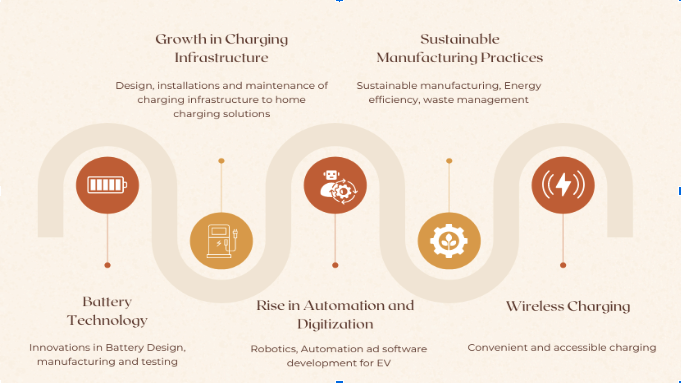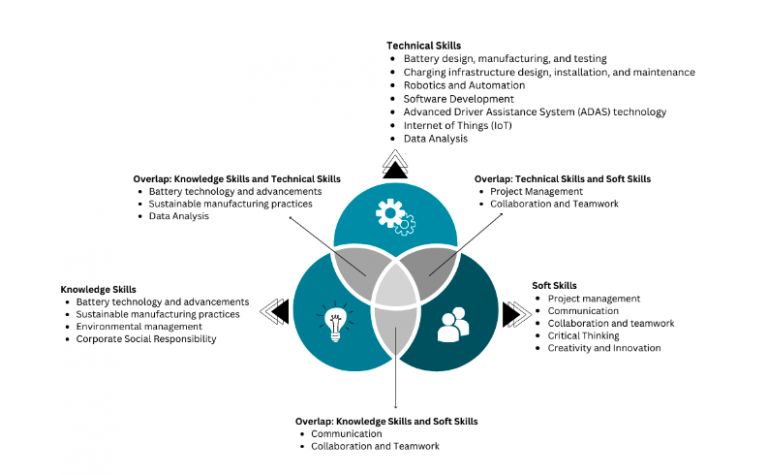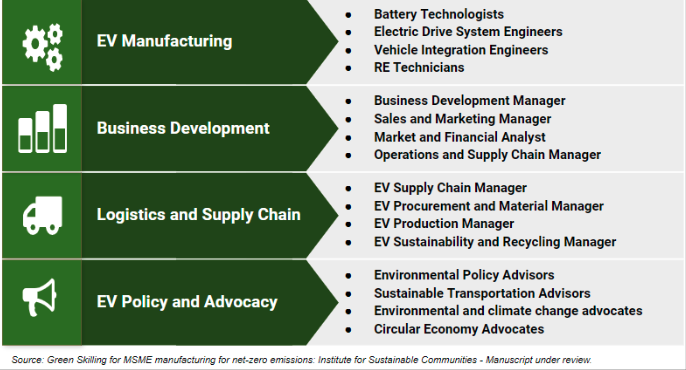Charging Ahead: Opportunities for Green Skilling in the Evolving Indian EV Landscape
April 27, 2023
Authors

Ishwari Latey

Megha Nath
The electric vehicle (EV) industry is rapidly growing, with global sales increasing by 75% from 2021 to Q1 of 2022. In India, the opportunities for green skilling are directly tied to the government’s target of 30% electric vehicle penetration, which is expected to create 10 million jobs by 2030. A career in the EV industry can pay as much as 20-30% more than traditional automotive careers due to the need for specialized skills and increased labor demand. It’s an exciting opportunity for those interested in a career in the expanding green economy.
Demand for skills create new job opportunities for young professionals

In the EV sector, a range of overlapping skills are required, including technical, soft and knowledge-based skills. This overlap is due to the holistic approach the EV industry takes to the manufacturing sector overall (Figure 2). Upskilling requires the development of green skills such as electrical engineering, battery technology, sustainable manufacturing, logistics and supply chain management, and environmental policy. Apart from these skills, critical thinking, problem-solving, and adaptability are essential skills for individuals to succeed in this constantly evolving industry. Possessing these skills can be beneficial for college students and recent graduates who seek success in the growing EV industry.

The charging dilemma: An example of knowledge and skills leading to innovative solutions
The EV industry is addressing the challenge of fast charging, which is the quick charging of an EV battery in under 30 minutes. However, fast charging may cause battery issues. Ultra-fast chargers are being considered but are still in the early stages of development. New battery technologies are being developed with new chemistries and materials for battery construction and advanced battery management systems to monitor and control the battery during fast charging.
To address these battery challenges, the EV sector has looked to combine knowledge and skills from professionals across various disciplines to lead to innovative solutions. Some of these new ideas include exploring new battery materials to increase energy density and reduce production costs, computer scientists developing algorithms for EV route planning and optimization, and sustainability experts providing insights into the environmental and social impact of the EV industry. To succeed in these fields, one must possess a variety of essential skills.
Career opportunities for college graduates
The EV industry offers numerous career opportunities for college graduates across various fields. Graduates with engineering, technology, and renewable energy degrees can work in EV manufacturing as battery technologists, electric drive system engineers, vehicle integration engineers, and renewable energy technicians. Figure 3 presents a visualization of the common green skills required for the EV sector’s four fields: EV Manufacturing, EV Business Development, EV Logistics and Supply Chain, and EV Policy and Advocacy. It identifies the significant overlap in green skills required across various EV fields, suggesting opportunities for cross-functional training programs. Figure 3 suggests that:
- The skills of project management, communication, and team leadership are essential across all fields, while technical skills such as data analysis and software development are more relevant to EV Business Development.
- Supply chain management and sustainability are vital for EV Logistics and Supply Chain, while knowledge of policy and advocacy is crucial for the EV Policy and Advocacy field.

Online resources to explore
Before signing up for a full-time course or starting an internship, students can use the following online resources to gain skills and knowledge.
- Coursera offers innovative online courses on battery technology, upcoming electric vehicle technologies and Industry 4.0. One of the notable courses for the Indian context is the EV certification on power electronics and motors from IIT Bombay and Ecole des ponts Paristech.
- EdX, an E-learning platform, hosts business-oriented courses on EV, by MIT. One of Europe’s leading Universities- TU Delft has contributed to the EV upskilling requirement by creating wonderful and easy-to-avail courses for professionals and students on the EDx platform.
- The Indian Government’s SWAYAM (Study Webs of Active-Learning for Young Aspiring Minds) Platform is great for fundamentals of EV upskilling for a fraction of the cost, with a special highlight of a course from IIT Madras.
The EV industry is a rapidly growing manufacturing sector with great potential to positively impact the environment and address sustainability challenges. By developing the necessary skills and knowledge in EV manufacturing, business development, logistics, supply chain, and EV policy and advocacy, college students can contribute to and participate in this growing industry and create a better future for next generations. With the proper education and training, college graduates can pave the way toward a more sustainable and innovative future in the EV industry.
